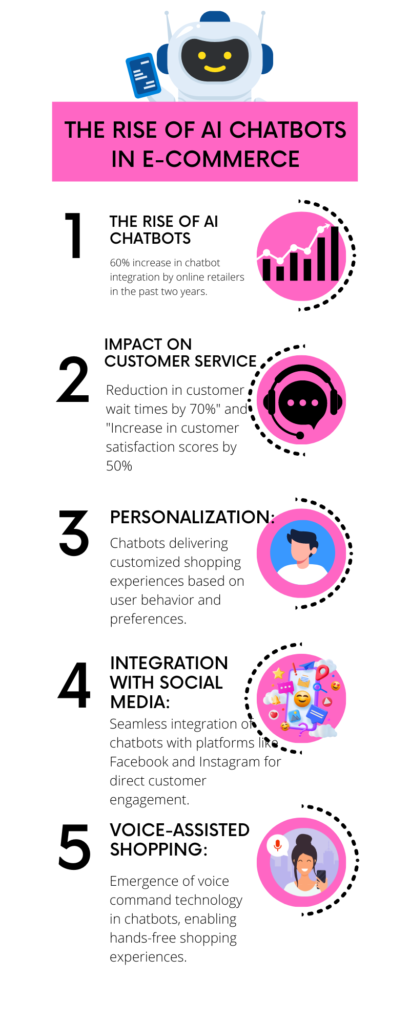
Introduction: In the dynamic world of online retail, the advent of artificial intelligence (AI) has ushered in a new era, revolutionizing how businesses interact with customers. Among these AI-driven innovations, chatbots have emerged as a pivotal tool, seamlessly bridging the gap between virtual shopping experiences and personalized customer service. As the ecommerce landscape continues to evolve, AI chatbots are not just a trend but a transformative force, reshaping the way consumers browse, interact, and purchase online. This blog delves into the burgeoning world of AI chatbot trends in ecommerce, highlighting how these intelligent assistants are setting new benchmarks in customer engagement and shaping the future of online shopping.
The Rise of AI Chatbots in Ecommerce
As we delve into the realm of ecommerce, it’s evident that AI chatbots have become more than just digital assistants; they are now integral components of the customer journey. Their rise can be attributed to the increasing demand for instant, 24/7 customer service and the need for efficient, scalable solutions in handling customer inquiries. AI chatbots, equipped with the capability to learn from interactions and improve over time, offer a level of convenience and personalization that traditional customer service channels often lack. This evolution marks a significant shift in how businesses approach customer engagement, prioritizing speed, accuracy, and a more tailored shopping experience. In this environment, chatbots are not just tools but strategic assets that enhance customer satisfaction and drive ecommerce growth.

Understanding AI Chatbots and Their Functionality
AI chatbots, at their core, are sophisticated programs designed to simulate human-like conversations with users, primarily through text but increasingly through voice interactions as well. These chatbots leverage technologies such as natural language processing (NLP) and machine learning to understand, interpret, and respond to user queries in a natural, conversational manner. The functionality of AI chatbots extends beyond mere scripted responses; they are capable of learning from past interactions, enhancing their ability to handle a wide range of customer inquiries with greater accuracy over time. This ability to ‘learn’ and ‘adapt’ enables them to provide personalized recommendations, assist in navigating websites, and even handle complex customer service tasks, thereby significantly enriching the user experience in the ecommerce domain.
Why AI Chatbots are Game-Changers for Ecommerce
The transformative impact of AI chatbots in ecommerce stems from their ability to redefine customer interactions. They offer a dual advantage: enhancing customer experience while streamlining business operations. For customers, chatbots provide instant responses, reducing wait times and improving overall satisfaction. This immediacy is crucial in the fast-paced online shopping environment where delayed responses can lead to lost sales. From a business perspective, chatbots offer scalability, handling thousands of queries simultaneously, which would be impossible for human customer service teams. Moreover, they gather valuable data from customer interactions, providing insights that can be used to personalize shopping experiences and tailor marketing strategies. This level of personalization, efficiency, and data-driven decision-making positions AI chatbots as game-changers in the world of ecommerce.
Key Trends in AI Chatbots for Ecommerce
A closer look at the current landscape reveals several key trends shaping the use of AI chatbots in ecommerce. One prominent trend is the shift towards hyper-personalization, where chatbots are being used to offer highly personalized shopping experiences based on individual customer preferences and past behavior. Another emerging trend is the integration of chatbots with various social media platforms, making them accessible to a broader audience and facilitating seamless shopping experiences directly from social media feeds. Additionally, the advancement of voice technology is enabling chatbots to move beyond text-based interactions, allowing for more natural and intuitive voice-assisted shopping experiences. These trends not only enhance the functionality of chatbots but also open up new avenues for customer engagement and sales in the ecommerce sector.
Personalization Through AI Chatbots
The power of personalization in ecommerce cannot be overstated, and AI chatbots are at the forefront of this revolution. By analyzing customer data such as purchase history, browsing behavior, and preferences, chatbots can provide tailored recommendations, guiding shoppers towards products they are more likely to purchase. This level of personalization not only enhances the shopping experience but also boosts customer loyalty and retention. Chatbots can also engage customers with personalized messaging and offers, creating a sense of individual attention that was once exclusive to in-store experiences. This trend towards personalization, powered by AI, is transforming the ecommerce landscape, making shopping more intuitive, efficient, and enjoyable for customers.
Integration of AI Chatbots with Social Media
The integration of AI chatbots with social media platforms is another significant trend revolutionizing ecommerce. This fusion allows businesses to extend their reach and engage with customers directly on platforms where they spend a considerable amount of time. Chatbots on social media can facilitate instant communication, answer queries, and even complete sales transactions within the platform, providing a seamless shopping experience. For instance, a customer can inquire about a product seen in a Facebook post and complete the purchase through a chatbot conversation without leaving the site. This integration not only streamlines the shopping process but also leverages the vast user base of social media, opening up new opportunities for customer engagement and sales.
AI Chatbots and Voice Shopping
The advent of voice technology is giving rise to an exciting new trend in ecommerce: voice-assisted shopping through AI chatbots. These voice-enabled bots offer a hands-free shopping experience, adding convenience and accessibility for users. Customers can now use voice commands to search for products, ask questions, and even make purchases, all without typing a single word. This technology is particularly beneficial for multitasking individuals and those with visual or physical impairments. Voice shopping is not just about convenience; it represents a more natural and intuitive way of interacting with technology, mirroring human conversation. As voice recognition technology continues to advance, voice-assisted shopping is poised to become a staple in the ecommerce world, further enhancing the capabilities and reach of AI chatbots.

Challenges and Future Directions
While AI chatbots are transforming ecommerce, they also bring challenges and areas for future development. One significant challenge is ensuring the chatbot’s ability to understand and process diverse and complex customer queries effectively. There’s a fine line between a helpful chatbot and one that leads to customer frustration due to misunderstanding or limited responses. Another area for future enhancement is emotional intelligence in AI chatbots. As they become more integrated into customer service roles, the ability to recognize and respond to emotional cues will be crucial for deeper, more empathetic customer interactions. Furthermore, balancing privacy concerns with personalized experiences remains a critical issue, as chatbots often handle sensitive customer data. Looking ahead, advancements in AI and machine learning will likely address these challenges, leading to more sophisticated, intuitive, and trusted chatbots in the ecommerce sector.
Overcoming Challenges in AI Chatbot Implementation
Addressing the challenges associated with AI chatbots in ecommerce requires a multifaceted approach. Firstly, continuous improvement in natural language processing and machine learning algorithms is essential for enhancing the chatbots’ understanding and response accuracy. Secondly, implementing robust privacy and security measures is crucial to protect customer data and build trust. Educating customers on how their data is used and ensuring transparency can also alleviate privacy concerns. Additionally, integrating human support with chatbots can create a hybrid customer service model, where complex queries are escalated to human representatives, ensuring a seamless customer experience. These strategies not only mitigate the challenges but also pave the way for more sophisticated, reliable, and customer-friendly AI chatbot solutions in ecommerce.

The Future of AI Chatbots in Ecommerce
Looking ahead, the future of AI chatbots in ecommerce is bright and full of potential. One of the key developments we can anticipate is the increased use of conversational AI to create more natural, human-like interactions. This advancement will likely involve integrating more advanced machine learning models and incorporating emotional intelligence to better understand and respond to user sentiments. Another future direction is the expansion of chatbots into omnichannel platforms, providing a consistent and unified customer experience across various digital touchpoints. Additionally, we may see AI chatbots becoming more proactive, predicting customer needs and initiating conversations to offer assistance or recommendations. As these technologies evolve, AI chatbots will become even more integral to the ecommerce ecosystem, driving innovation and redefining customer service standards.
Real-World Examples of AI Chatbots Transforming Ecommerce
The transformative impact of AI chatbots in ecommerce is best illustrated through real-world examples. Major online retailers are utilizing chatbots to offer personalized shopping assistance, such as recommending products based on user preferences and previous purchases. Some chatbots are equipped to handle transactional tasks, like tracking orders or processing returns, enhancing the overall customer service experience. In the luxury retail sector, AI chatbots provide concierge-like services, offering product information, styling advice, and even helping with reservations and bookings. These examples highlight the diverse applications of AI chatbots in ecommerce, showcasing their ability to not only streamline operations but also to create unique and memorable customer experiences.
Case Studies of Successful AI Chatbot Integrations
Delving deeper into specific success stories, several case studies highlight the effectiveness of AI chatbot integrations in ecommerce. For instance, a well-known fashion retailer implemented a chatbot that increased customer engagement by providing styling tips and personalized fashion recommendations, resulting in a notable uplift in sales. Another example is an electronics retailer whose chatbot helped streamline customer support, significantly reducing response times and increasing customer satisfaction. These case studies demonstrate the tangible benefits of AI chatbots in various ecommerce settings, from enhancing customer interaction to improving operational efficiency. By analyzing these success stories, businesses can gain insights into best practices and strategies for integrating AI chatbots into their own ecommerce platforms.

What Shoppers Say: Consumer Responses to AI Chatbots
Consumer feedback provides a valuable perspective on the effectiveness of AI chatbots in ecommerce. Surveys and studies consistently show that shoppers appreciate the instantaneity and convenience that chatbots provide. Many users report positive experiences with chatbots for routine inquiries, like checking product availability or tracking orders. However, there is also feedback indicating areas for improvement, particularly in handling more complex queries and providing more human-like interactions. This consumer input is crucial for ecommerce businesses, as it highlights what shoppers value in their online experiences and where chatbots can be enhanced to meet these expectations. Overall, the growing acceptance and positive response to AI chatbots among consumers underscore their potential and the need for ongoing development to align with shopper preferences.
Implementing AI Chatbots in Your Ecommerce Strategy
Integrating AI chatbots into an ecommerce strategy is a decision that can significantly enhance customer interaction and operational efficiency. The first step is to identify the specific needs and challenges of your ecommerce business that chatbots can address, such as customer service, sales assistance, or product recommendations. Next, choosing the right chatbot platform is crucial – it should align with your business objectives, be capable of handling your specific requirements, and offer scalability for future growth. Training the chatbot with relevant data and continuously updating it based on customer interactions and feedback is also essential for maintaining its effectiveness. Lastly, businesses should regularly analyze the performance of their chatbots, using metrics like customer satisfaction, resolution rate, and sales conversion to refine and optimize their functionality
Measuring the Success of AI Chatbots in Ecommerce
To gauge the effectiveness of AI chatbots in ecommerce, it’s essential to measure their impact using specific metrics and KPIs. Customer satisfaction scores can provide insights into how well the chatbot meets customer needs and expectations. Another key metric is the resolution rate, which indicates the chatbot’s ability to resolve queries without human intervention. Additionally, monitoring the conversion rate – the percentage of chatbot interactions that lead to a sale – can reveal the direct impact of chatbots on revenue. Engagement metrics, such as the number of interactions and average conversation length, can also be valuable in understanding how customers interact with the chatbot. Regularly analyzing these metrics allows businesses to make data-driven decisions, continually improve the chatbot’s performance, and enhance the overall customer experience.
Conclusion: Embracing the Future with Oodles All in One App
In conclusion, AI chatbots represent a significant leap forward in the realm of ecommerce, offering unparalleled opportunities for enhancing customer interaction, personalization, and operational efficiency. As we’ve explored, these intelligent systems are reshaping the future of online shopping, bringing a new level of sophistication and convenience to the customer experience. While challenges exist, the continuous advancements in AI technology promise to further refine and expand the capabilities of chatbots. For businesses looking to stay ahead in the rapidly evolving ecommerce landscape, embracing AI chatbots is not just an option but a necessity. In this context, ‘Oodles All in One App’ emerges as a comprehensive solution, integrating the power of AI chatbots into your ecommerce strategy, ensuring you are well-equipped to meet the demands of the modern digital shopper and thrive in this new era of online retail.

